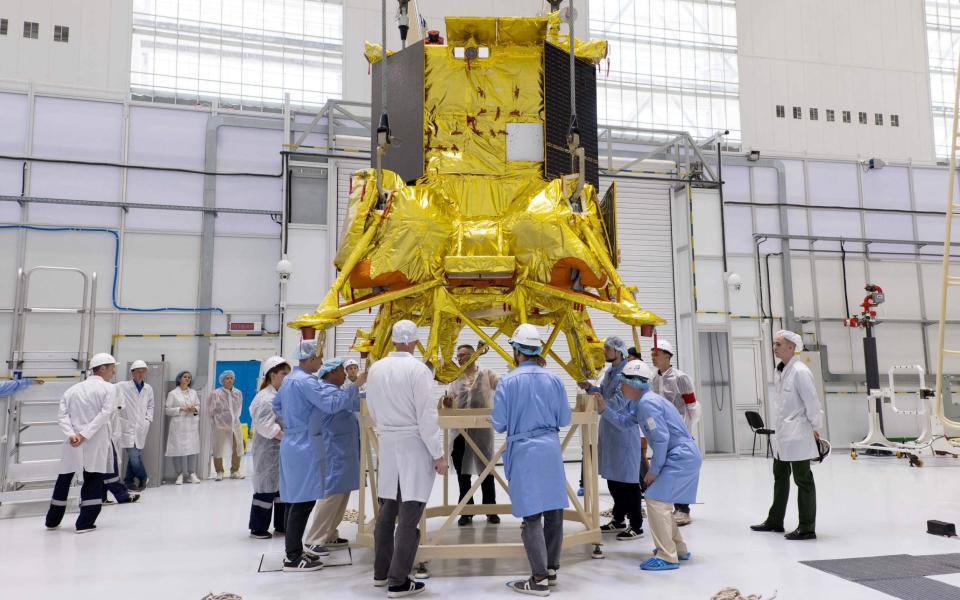Russian space craft smashes into Moon as historic mission ends in disaster

The Kremlin’s first mission to the Moon for nearly 50 years has crashed into the surface, destroying Vladimir Putin’s ambitions of winning a new space race.
Roscosmos, the Russian space agency, said that it lost contact with the uncrewed Luna-25 as it was orbiting the Moon ahead of a planned landing.
The failure of Luna-25 is a major blow to the prestige of the Russian space programme and also to the Kremlin, which had wanted to use it to promote Russia as a global technological superpower.
A successful mission by Luna-25 would have paved the way for further Russian missions to the Moon. The crash also undermines plans to join China to build a Moon base by the mid-2030s.
“At around 2.57pm Moscow time, communication with Luna-25 was interrupted,” it said. “The device switched to an unplanned orbit and ceased to exist as a result of a collision with the surface of the Moon.”

Analysts said that instead of showing off Russia’s cutting-edge technology, the failure of the mission highlighted how Russian ingenuity and technological innovation have fallen behind rivals since the 1950s and 1960s, when it scored several Space Race victories over the US, including putting the first dog and man into space.
“Luna-25 was supposed to show how developed and modern Russia was. Rather it has had the opposite effect,” said Stephen Hall, a lecturer in Russian politics at the University of Bath.
In 1957, the Soviet Union launched Sputnik-2 into Space with Laika, a mongrel Moscow street dog aboard, and in 1961 its Vostok-1 space rocket made Yuri Garagin the first man in Space.
Luna-25 blasted off to space on Aug 11 to much excitement about the prowess of Russian technology and talk about Russia leading a new space race to find water on the Moon for the first time.
The Kremlin had insisted that Luna-25 was shown on TV blasting off from its launch site in Russia’s far east next to a giant V, a pro-war symbol.
Luna-25 was supposed to land on the Moon’s south pole next week and then spend a year searching for water and collecting rock samples.
Abbas Gallyamov, a former Kremlin speech writer who has now quit Russia, said that the crash had shown up Russian officials boasting of their Moon mission.
He said that the project had been planned for 18 years and had received the personal backing of Vladimir Putin.
“Modern Russia has failed to carry out a single interplanetary mission,” he said.
Western space agencies dropped their cooperation with Roscosmos after the Kremlin invaded Ukraine in February last year. The launch of Luna-25 was supposed to show that Russian technology could thrive without their help.
Roscosmos, which had warned on Saturday afternoon that Luna-25 was experiencing an “abnormal situation” before admitting on Sunday that it had crashed, said it would launch an investigation into the failure of the mission.
The Soviet Union used the Space Race during the Cold War to promote itself as technologically more advanced than its US rival, but now the Kremlin will have to watch as India beats it to the Moon in search of water.
“Enthusiasts of human progress are sad because of the crash of Luna-25,” said Sergei Markov, a former adviser to the Kremlin. “We wish success to the Indian space explorers!”
On Friday, Indian officials said that their Chandrayaan-3 mission, launched on July 24 was closing in on the Moon and would land on Aug 23.
If it is successful, India will become the fourth country to land a mission on the Moon after the US, still the only country to land men on the Moon, Russia and China.
China and the US are both expected to launch Moon missions soon.
The Kremlin’s last successful mission to the Moon was Luna-24 in 1976, although it has regularly sent missions to the International Space Station.

 Yahoo News
Yahoo News 
